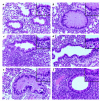Allergen-specific Th1 cells fail to counterbalance Th2 cell-induced airway hyperreactivity but cause severe airway inflammation
- PMID: 9916129
- PMCID: PMC407883
- DOI: 10.1172/JCI5155
Allergen-specific Th1 cells fail to counterbalance Th2 cell-induced airway hyperreactivity but cause severe airway inflammation
Abstract
Allergic asthma, which is present in as many as 10% of individuals in industrialized nations, is characterized by chronic airway inflammation and hyperreactivity induced by allergen-specific Th2 cells secreting interleukin-4 (IL-4) and IL-5. Because Th1 cells antagonize Th2 cell functions, it has been proposed that immune deviation toward Th1 can protect against asthma and allergies. Using an adoptive transfer system, we assessed the roles of Th1, Th2, and Th0 cells in a mouse model of asthma and examined the capacity of Th1 cells to counterbalance the proasthmatic effects of Th2 cells. Th1, Th2, and Th0 lines were generated from ovalbumin (OVA)-specific T-cell receptor (TCR) transgenic mice and transferred into lymphocyte-deficient, OVA-treated severe combined immunodeficiency (SCID) mice. OVA-specific Th2 and Th0 cells induced significant airway hyperreactivity and inflammation. Surprisingly, Th1 cells did not attenuate Th2 cell-induced airway hyperreactivity and inflammation in either SCID mice or in OVA-immunized immunocompetent BALB/c mice, but rather caused severe airway inflammation. These results indicate that antigen-specific Th1 cells may not protect or prevent Th2-mediated allergic disease, but rather may cause acute lung pathology. These findings have significant implications with regard to current therapeutic goals in asthma and allergy and suggest that conversion of Th2-dominated allergic inflammatory responses into Th1-dominated responses may lead to further problems.
Figures








Similar articles
-
Th type 1-stimulating activity of lung macrophages inhibits Th2-mediated allergic airway inflammation by an IFN-gamma-dependent mechanism.J Immunol. 2001 Feb 1;166(3):1471-81. doi: 10.4049/jimmunol.166.3.1471. J Immunol. 2001. PMID: 11160186
-
Zerumbone enhances the Th1 response and ameliorates ovalbumin-induced Th2 responses and airway inflammation in mice.Int Immunopharmacol. 2015 Feb;24(2):383-391. doi: 10.1016/j.intimp.2014.12.027. Epub 2015 Jan 5. Int Immunopharmacol. 2015. PMID: 25573403
-
Allergen-specific Th1 cells counteract efferent Th2 cell-dependent bronchial hyperresponsiveness and eosinophilic inflammation partly via IFN-gamma.J Immunol. 2001 Jan 1;166(1):207-17. doi: 10.4049/jimmunol.166.1.207. J Immunol. 2001. PMID: 11123294
-
When engineered to produce latent TGF-beta1, antigen specific T cells down regulate Th1 cell-mediated autoimmune and Th2 cell-mediated allergic inflammatory processes.Cytokine Growth Factor Rev. 2000 Mar-Jun;11(1-2):89-96. doi: 10.1016/s1359-6101(99)00032-5. Cytokine Growth Factor Rev. 2000. PMID: 10708956 Review.
-
Critical Involvement of CD44 in T Helper Type 2 Cell-Mediated Eosinophilic Airway Inflammation in a Mouse Model of Acute Asthma.Front Immunol. 2022 Jan 7;12:811600. doi: 10.3389/fimmu.2021.811600. eCollection 2021. Front Immunol. 2022. PMID: 35069598 Free PMC article. Review.
Cited by
-
Chlorogenic acid ameliorated allergic rhinitis-related symptoms in mice by regulating Th17 cells.Biosci Rep. 2020 Nov 27;40(11):BSR20201643. doi: 10.1042/BSR20201643. Biosci Rep. 2020. PMID: 33015714 Free PMC article.
-
Glucuronoxylomannan promotes the generation of antigen-specific T regulatory cell that suppresses the antigen-specific Th2 response upon activation.J Cell Mol Med. 2009 Aug;13(8B):1765-1774. doi: 10.1111/j.1582-4934.2008.00583.x. J Cell Mol Med. 2009. PMID: 20187301 Free PMC article.
-
Antigen-sensitized CD4+CD62Llow memory/effector T helper 2 cells can induce airway hyperresponsiveness in an antigen free setting.Respir Res. 2005 May 28;6(1):46. doi: 10.1186/1465-9921-6-46. Respir Res. 2005. PMID: 15921525 Free PMC article.
-
Promise and pitfalls in animal-based asthma research: building a better mousetrap.Immunol Res. 2006;35(3):279-94. doi: 10.1385/IR:35:3:279. Immunol Res. 2006. PMID: 17172652 Review.
-
Fas-positive T cells regulate the resolution of airway inflammation in a murine model of asthma.J Exp Med. 2006 May 15;203(5):1173-84. doi: 10.1084/jem.20051680. Epub 2006 Apr 17. J Exp Med. 2006. PMID: 16618792 Free PMC article.
References
-
- Gergen PJ, Weiss KB. Changing patterns of asthma hospitalization among children: 1979 to 1987. JAMA. 1990;264:1688–1692. - PubMed
-
- Kirby JG, Hargreave FE, Gleich GJ, O’Byrne PM. Bronchoalveolar cell profiles of asthmatic and non-asthmatic subjects. Am Rev Respir Dis. 1987;136:379–383. - PubMed
-
- Bradley LB, et al. Eosinophils, T-lymphocytes, mast cells, neutrophils and macrophages in bronchial biopsy specimens from atopic subjects with asthma: comparison with biopsy specimens from atopic subjects without asthma and normal control subjects and relationship to bronchial hyperresponsiveness. J Allergy Clin Immunol. 1991;88:661–674. - PubMed
-
- Umetsu DT, DeKruyff RH. Th1 and Th2 CD4+ cells in human allergic diseases. J Allergy Clin Immunol. 1997;100:1–6. - PubMed
-
- Martinez FD, et al. Asthma and wheezing in the first six years of life. N Engl J Med. 1995;332:133–138. - PubMed
Publication types
MeSH terms
Substances
Grants and funding
LinkOut - more resources
Full Text Sources
Other Literature Sources
Medical

